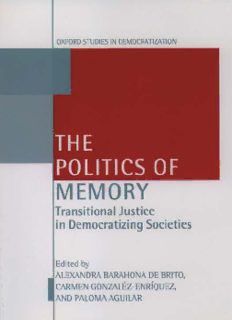Table Of ContentOxford Studies in Democratization
Series Editor: Laurence Whitehead
The Politics of Memory
Oxford Studies in Democratization
Series Editor: Laurence Whitehead
Oxford Studies in Democratization is a series for scholars and students
of comparative politics and related disciplines. Volumes will concentrate
on the comparative study of the democratization processes that
accompanied the decline and termination of the cold war. The
geographical focus of the series will primarily be Latin America, the
Caribbean, Southern and Eastern Europe,
and relevant experiences in Africa and Asia.
OTHER BOOKS IN THE SERIES
The New Politics of Inequality in Latin America:
Rethinking Participation and Representation.
Douglas A. Chalmers, Carlos M. Vilas,
Katherine Roberts Hite,
Scott B. Martin, Kerianne Piester,
and Monique Segarra
Human Rights and Democratization in Latin America:
Uruguay and Chile
Alexandra Barahona de Brito
Citizenship Rights and Social Movements:
A Comparative and Statistical Analysis
Joe Foweraker and Todd Landman
Regimes, Politics, and Markets:Democratization and Economic Change in Southern
and Eastern Europe
José Marí Maravall
Democracy Between Consolidation and Crisis
in Southern Europe
Leonardo Morlino
The Bases of Party Competition in Eastern Europe:
Social and Ideological Cleavages in Post Communist States
Geoffrey Evans and Stephen Whitefield
The Democratic Developmental State:
Politics and Institutional Design
Marc Robinson and Gordon White
The International Dimensions of Democratization:
Europe and the Americas
Laurence Whitehead
The Legacy of Human Rights Violations
in the Southern Cone:
Argentina, Chile and Uruguay
Luis Roniger and Mario Sznajder
The Politics of Memory
Transitional Justice in Democratizing Societies
Edited By
Alexandra Barahona de Brito
Carmen González-Enríquez
and
Paloma Aguilar
GreatClarendonStreet,OxfordOX26DP
OxfordUniversityPressisadepartmentoftheUniversityofOxford
ItfurtherstheUniversity'sobjectiveofexcellenceinresearch,scholarship,
andeducationbypublishingworldwidein
OxfordNewYork
AucklandBangkokBuenosAiresCapeTownChennai
Dar esSalaamDelhiHongKongIstanbulKarachiKolkata
KualaLumpurMadridMelbourneMexicoCityMumbaiNairobi
SãoPauloShanghaiTaipeiTokyoToronto
Oxfordisaregisteredtrademark ofOxfordUniversityPress
intheUK andincertainothercountries
PublishedintheUnitedStatesby
OxfordUniversityPressInc., NewYork
©Thevariouscontributors2001
Themoralrightsoftheauthorshavebeenasserted
DatabaserightOxfordUniversityPress(maker)
Allrightsreserved.Nopartofthispublicationmaybereproduced,
storedinaretrievalsystem,or transmitted,inanyform orbyanymeans,
withoutthepriorpermissioninwriting ofOxfordUniversityPress,
oras expresslypermittedbylaw, or under termsagreedwiththeappropriate
reprographicsrightsorganization.Enquiriesconcerningreproduction
outsidethescopeoftheaboveshouldbesenttotheRightsDepartment,
OxfordUniversityPress,attheaddressabove
Youmustnotcirculatethisbookinanyotherbindingorcover
andyoumustimposethissameconditiononanyacquirer
BritishLibraryCataloguinginPublicationData
Dataavailable
LibraryofCongressCataloginginPublicationData
ISBN0–19–924080–9 (pbk.)
ISBN0–19–924090–6
Alexandra Barahona de Brito dedicates this book to her parents
Carlos and Terry, her sister Marina, her children Carlotta and
Afonso, and to Joaquim Paço d'Arcos, a true friend.
Carmen González-Enríquez dedicates this book to her children,
Celia and Julio, and her husband, Ignacio.
Paloma Aguilar dedicates this book, as always, to her family,
particularly her companion Jesús, her parents, Susa and Ángel,
her sister Susana, and this time also her niece, Sonia, the source
of unexpected joy and emotions.
This page intentionally left blank
Acknowledgements
AlexandraBarahonadeBritowouldliketothanktheLuso-AmericanDevelopmentFoundationinLisbon(FLAD)for
a generous Visiting Fellowship grant to carry out the editing and research work for the book in 1999 at the Center of
International Studies (CIS) at Princeton University. Thanks are due especially to Fernando Durão, the director of the
FLAD, and António Costa Pinto, one of the contributors to this book, for their support for the project. At the CIS,
thanks are due to director Michael Doyle and CIS staff Jerri, June and Pat, who most generously made her feel at
home.Mostespecially,shewouldliketothankNancyBermeo,theheadoftheSouthernEuropeanStudiesprogramme
at the Politics Department, and her lovely family, who extended a warm welcome, consistent support and friendship
during thework carried out in Princeton. In addition, she wouldlike to extend special thanks to Laurence Whitehead,
whogave the project crucial support in theearlystages whenit had no institutional support. Finally, she wouldliketo
thank Alan Angell, Fernando Pérez, the illustríssimo Maurizio Viroli, Astrid Arrarás, Jorge Silva, Bill Smith, David
Myhre, Jeremy Adelman Franklim, and Jonathan Allen.
Paloma Aguilar would like to thank all the people who have, over the last three years, been associated with her in the
‘Authoritarian Legacies’ project of Columbia University in New York. Thanks are due in this context to Nancy
Bermeo, Paola Cesarini, Consuelo Cruz, Margaret Graham, Frances Hagopian, Catherine Hite, Edward Malefakis,
Leonardo Morlino, Anthony Pereira, and Mark Ungar, as well as to Elizabeth Jelin, Elizabeth Lira, Eric Herschberg,
and Alexander Wilde, whom she met in the context of this project. Essential institutional support was received from
the Centre for Advanced Studies in Social Science of the Juan March Institute in Madrid, where she has enjoyed
excellentintellectual and personal surroundings for the development of her work over the last ten years. Thanks are
also due to the Ford Foundation. Carmen González and Paloma Aguilar also thank the Political Science Department
of the National University for Distance Education (UNED) in Madrid.
viii ACKNOWLEDGEMENTS
All three editors would like to thank Laurence Whitehead, as director of the ‘Studies in Democratization’ series at
Oxford University Press (OUP), of which this book is a part, as well as Dominic Byatt, Sandra Benko and Amanda
Watkinsat OUP, for theirpatiencethroughoutthepreparationofthebook. We alsothank theexternalreaders, whose
comments on an early version of the projectand some of its chapters were extremely useful for improving its quality.
Last but not least, we thank Juan Linz for bringing us together in the first place.
Alexandra Barahona de Brito
Paloma Aguilar
Carmen González-Enríquez
Contents
Acknowledgements vii
List of Tables and Figure xi
Abbreviations xii
Contributors xxii
Introduction Alexandra Barahona de Brito, Paloma Aguilar, Carmen González-Enríquez 1
1. The Role of International Actors in National Accountability Processes Naomi Roht-Arriaza 40
2. Settling Accounts with the Past in a Troubled Transition to Democracy: The Portuguese Case António Costa
Pinto 65
3. Justice, Politics and Memory in the Spanish Transition Paloma Aguilar 92
4. Truth, Justice, Memory, and Democratization in the Southern Cone Alexandra Barahona de Brito 119
5. War, Peace, and Memory Politics in Central America Rachel Sieder 161
6. Justice and Legitimacy in the South African Transition Richard A. Wilson 190
7. De-communization and Political Justice in Central and Eastern Europe Carmen González-Enríquez 218
Description:One of the most important political and ethical issues faced during a political transition from authoritarian or totalitarian to democratic rule is how to deal with legacies of repression. This book explores the important aspect of transitional politics, assessing how Portugal, Spain, the countries

